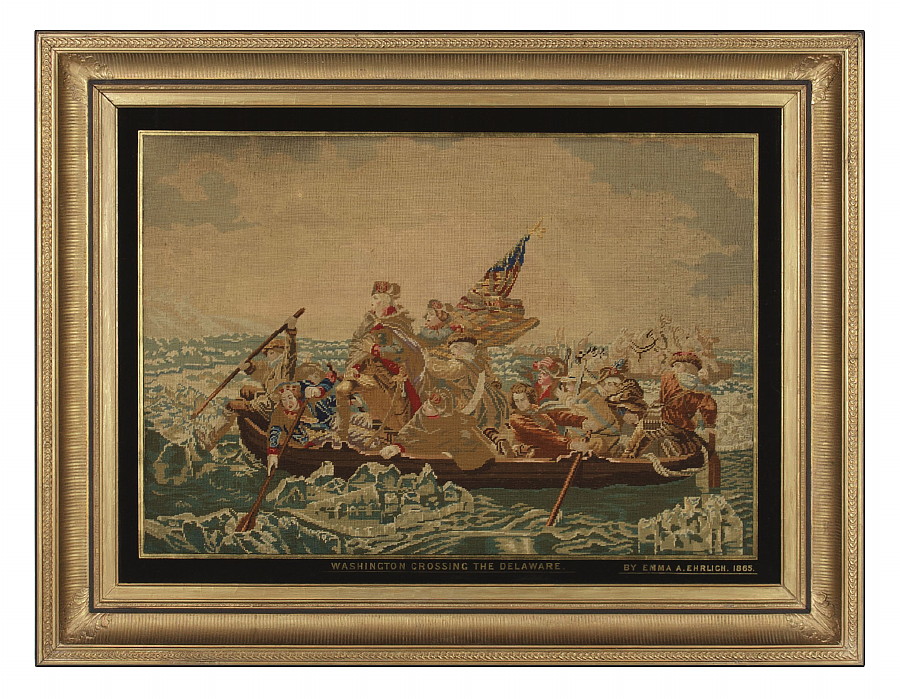
| |
MAGNIFICENT NEEDLEWORK RENDERING OF EMANUEL GOTTLIEB LEUTZE'S PAINTING OF WASHINGTON CROSSING THE DELAWARE, IN ITS ORIGINAL FRAME WITH REVERSE-PAINTED AND GILDED GLASS, SIGNED AND DATED 1865 |
| |
|
| Dimensions (inches): |
38.25" tall x 49.25" wide x 3" deep. |
| Description: |
|
MAGNIFICENT NEEDLEWORK RENDERING OF EMANUEL GOTTLIEB LEUTZE'S PAINTING OF WASHINGTON CROSSING THE DELAWARE, IN ITS ORIGINAL FRAME WITH REVERSE-PAINTED AND GILDED GLASS, SIGNED AND DATED 1865:
1865, Civil War period needlework picture, styled after Emanuel Gottlieb Leutze's 1851 painting of Washington's Crossing of the Delaware River. The most extraordinary feature can be seen in the exceptional petit point work, used to skillfully render detailed facial expressions. These tiny stitches and the accuracy with which they were applied sets this textile apart from other fine embroidery of the period. The textile is largely executed with wool yarn on canvas, but silk floss was incorporated to capture the image of the silk battle flag, as well as to highlight various parts of the soldier's clothing, as well as Washington's hair. Perhaps the most interesting feature in silk is the North Star, which appears in the sky above and before the general.
The piece is signed and dated "Emma A. Ehrlich, 1865." by way of the reverse painted and gilded glass, which is original to the textile. The substantial, Hudson River style frame is also original.
This type of stitchery, commonly called canvas work or Berlinwork, was popular during the mid-19th century. The combination of intricately designed patterns and advances in the dying of wool allowed for subtle shading and an unusual level of detail. This is an uncommonly fine example because of the artist's use of petit point. I have not before seen this present in a patriotic needlework of this type.
Leutze's original painting was an 1851 oil-on-canvas that recreated the image in the German-born painter's mind of what we now know to be a mythical scene. Modern research shows that Washington and his men were on a group of make-shift rafts, assembled for the arduous task of crossing the frozen river on Christmas night, 1776, to suprise the British at Trenton. The original work was part of the collection at the Kunsthalle in Bremen, Germany and was destroyed in a British air raid in 1942. The irony of the loss led to a persistent joke that that particular raid was Britain's final retaliation for the American Revolution.
Leutze painted a second, full-sized replica at approximately the same time as the first. Begun in 1850, it was placed on exhibition in New York in October 1851, where more than 50,000 people viewed it. This painting is presently at the Met in New York. Leutze made other copies, one of which is in the West Wing reception area of the White House.
Condition: The textile was professionally cleaned. There are very minor losses in the wool. A couple of tiny losses in the black reverse-painted glass were restored. Some of the minor losses in the frame were modestly restored, along with its gilded and painted surface. |
|
|
| |
|
| Primary Color: |
multicolored |
|
| Earliest Date: |
1865 |
|
| Latest Date: |
1865 |
|
| For Sale Status: |
Sold |
|
| Price |
SOLD |
|
| E-mail: |
info@jeffbridgman.com |
|
 |
|
Page Views:... 5179 |
|


